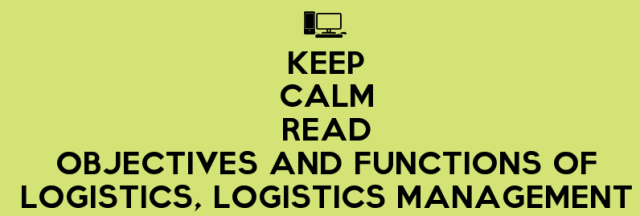gurpreetsingh
Gurpreet Singh
Logistics is concerned with getting products and services where they are needed and when they are desired. In a modern society most if the customers take excellent logistics service from company as granted and tend to notice logistics only when there is a problem.
For Example- Non availability of goods and services which they need very badly, when they visit retail store they expect goods to be in good condition, for ex- fresh fruits, meat, vegetables and the like.
It is difficult to visualize accomplishing any manufacturing and marketing actively, efficiently and effectively without any logistical support. Logistics is a broad far reaching function, having a great impact on the standard of living of a modern society.

TYPES OF LOGISTICS
Business Logistics- It is the part of the supply chain process that plans, implements and controls the efficient flow and storage of goods and services from point of origin to point of use or consumption.
Military Logistics- The design and integration of all aspects of support for the operational capability of the military forces and their equipments to ensure readiness, reliability, and efficiency
Event Logistics- The network of activities, facilities and personnel required to organize, schedule and deploy the resources for an event to take place.
Service Logistics-The acquisition, Scheduling, and management of the facilities personnel and material to support and sustain a service operation or business.
Logistics Management - Logistics management is a process of planning, executing, and controlling the efficient, effective, flow and storage of goods and services, and related information from point of origin to point of consumption for the purpose of conforming to customer requirement.
Objectives of Logistics Management
To make available the right quantity of right quality products at the right place and time in right condition.
To offer best service to consumers.
To reduce the cost of operations.
To maintain transparency in operations.
Functions of Logistics
Products are ordered, billed/invoiced, handled, packaged, packed, wrapped, bundled, sorted, crated, and braced.
Products are assembled and stored, warehoused, loaded, unloaded, shelved, displayed and crossdocked.
Products are shipped by air, railways, waterways, pipelines, and containers.
Products are exported, imported, documented marked and consolidated.
Products are traced, tracked, recycled and disposed.
Logistics customers service standards are set(time, availability, errors etc)
Other Functions
Breaking Bulks
Accumulating Bulk
Creating Assortments
Transaction Efficiency
Credit Facilities
Risk Taking
:SugarwareZ-161:
For Example- Non availability of goods and services which they need very badly, when they visit retail store they expect goods to be in good condition, for ex- fresh fruits, meat, vegetables and the like.
It is difficult to visualize accomplishing any manufacturing and marketing actively, efficiently and effectively without any logistical support. Logistics is a broad far reaching function, having a great impact on the standard of living of a modern society.

TYPES OF LOGISTICS
Business Logistics- It is the part of the supply chain process that plans, implements and controls the efficient flow and storage of goods and services from point of origin to point of use or consumption.
Military Logistics- The design and integration of all aspects of support for the operational capability of the military forces and their equipments to ensure readiness, reliability, and efficiency
Event Logistics- The network of activities, facilities and personnel required to organize, schedule and deploy the resources for an event to take place.
Service Logistics-The acquisition, Scheduling, and management of the facilities personnel and material to support and sustain a service operation or business.
Logistics Management - Logistics management is a process of planning, executing, and controlling the efficient, effective, flow and storage of goods and services, and related information from point of origin to point of consumption for the purpose of conforming to customer requirement.
Objectives of Logistics Management
To make available the right quantity of right quality products at the right place and time in right condition.
To offer best service to consumers.
To reduce the cost of operations.
To maintain transparency in operations.
Functions of Logistics
Products are ordered, billed/invoiced, handled, packaged, packed, wrapped, bundled, sorted, crated, and braced.
Products are assembled and stored, warehoused, loaded, unloaded, shelved, displayed and crossdocked.
Products are shipped by air, railways, waterways, pipelines, and containers.
Products are exported, imported, documented marked and consolidated.
Products are traced, tracked, recycled and disposed.
Logistics customers service standards are set(time, availability, errors etc)
Other Functions
Breaking Bulks
Accumulating Bulk
Creating Assortments
Transaction Efficiency
Credit Facilities
Risk Taking
:SugarwareZ-161:
Last edited by a moderator:
